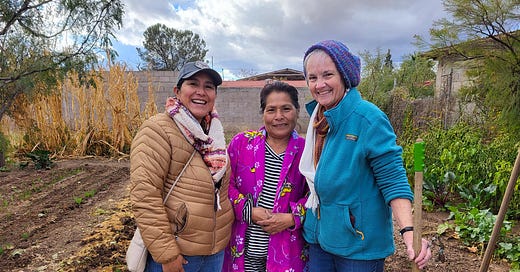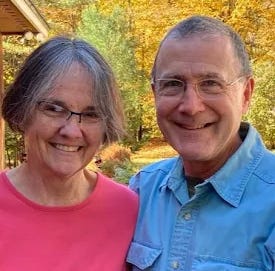'It's not abundance if we don't share it'
A retired Upstate New York couple sold their house and spent a year volunteering at the U.S-Mexico border.

Cynthia and Sam Pendergrast of Utica, N.Y., spent all of 2023 volunteering with the humanitarian organization Frontera de Cristo on the U.S.-Mexico border in Douglas, Arizona and Agua Prieta, Sonora.
Frontera de Cristo (Border of Christ) is a bi-national ministry of the Presbyterian Church in Mexico and the U.S.
Sam is a retired Presbyterian pastor and Cynthia is a retired early childhood educator who worked in early intervention, and later as a substitute teacher. They took turns writing posts all last year for their blog, A Year on the Border.
A while ago I sent five questions to Sam and Cynthia about their experiences. Sam responded to each, while Cynthia was in Iowa helping care for her mother. An excerpt from one of Cynthia’s blog posts is below Sam’s responses.
What was the process like for you both in deciding to spend a year at the border?
My first trip was a 1985 travel seminar for North American seminary students, in which we visited Costa Rica, Nicaragua, and Guatemala for a week each. Over the years I had led or gone with church groups to Honduras and Mexico, five times to the border with Presbyterian Border Ministry projects. Those are bi-national ministries shared by the Mexican Presbyterian Church (INPM) and US Presbyterian Church (PCUSA). So, as I approached retirement I wanted to go back to the border and spend a year, learning more about the realities of migration and the border. Cynthia agreed to go, despite having never been on any of those trips and knowing hardly any Spanish. We packed up our stuff and put it in storage, sold our house and one of our cars, loaded up the car and drove to Douglas, AZ, and lived in Agua Prieta, Sonora, for a year.
Was there an experience that was especially moving or profound?
I worked shifts five days a week at the Migrant Resource Center, where we offered hospitality, food, first aid, clothing, and information and orientation to migrants being expelled from the U.S. by Border Patrol. One case that highlighted the absurdity of the U.S. approach to immigrants stands out. A 72-year-old woman who had lived in Flagstaff for 35 years was expelled at the Douglas port of entry. All of her children and grandchildren lived in Flagstaff near her. She was picked up at a traffic stop for some reason and the authorities discovered she had long ago overstayed a visa. So they deported her. She was diabetic and on dialysis. She waited for a friend to retrieve her car and come to pick her up and take her to where her family had a house in Tijuana. However, she became so sick that we had to call an ambulance to take her to the hospital. Fortunately, her daughter-in-law arrived in time to accompany her to the hospital. I never saw her again, but I often wonder about her.
Can you give an example of an exchange you’ve had upon your return with someone who was either curious to learn about the border or already had strong opinions?
I was at a family funeral last Monday and was talking with my cousin, David. I was describing the situations that drive people from their homes and lead them to seek safety, work, asylum in the U.S. He said, "I thought they were sneaking across our border because they wanted to live in the U.S.” He had no idea what violence and extortion people face, and had not thought what it would take to cause someone to leave their home, their community, their country behind and undertake a dangerous journey into a country that viewed them as criminals.
Could you elaborate on something you wrote in a blog post, that your time at the border represented “a new experience of being alive in the world”?
I was tired of and disillusioned by the traditional church that seems to turn more and more inward as it declines. At the border I found a diverse, honest, loving, and inclusive faith community that clearly is not stuck in antiquated forms but is trying to live out the call to love neighbors, whoever they may be. It was very refreshing.
How has the “re-entry” process been for you both? What emotions have you each been dealing with since you’ve been back home, far from the US-Mexico border?
Re-entry has been hard. I feel dislocated, isolated, disoriented, wondering what to do with myself now that I'm retired and returned from my year at the border. I'm in a new community, renting while we look for a house to buy, feeling adrift. I'm starting to find ways to volunteer and figure out what retirement means now. Our sons live in the Boston area, so we really don't want to move to Arizona. Besides, the ecosystem can't bear more population growth there. Seeing all the new construction around Tucson seems quite absurd.
An excerpt from “A Year on the Border” by Cynthia:
“I think of the abundance in the stores north of the border. And I think of what Jack, our retired Mennonite pastor friend, said a few months ago. ‘It’s not abundance if we don’t share it.’ To share the mango and chamoy paletas I made during the summer with our neighbors. To share coffee and stories and time with the teachers and the children. In the sharing of time together, there is a sense of enough. People in Frontera de Cristo are busy, but always they have enough time to stop and talk. To listen. I am grateful that in the enough-ness of Agua Prieta there is an abundance to share.”





A retired pastor, so surely familiar with this line from the 10th chapter of Matthew’s Gospel: “Those who find their life will lose it, and those who lose their life for my sake will find it.”
Good for them! I’m sure their return is challenging. Jim, you have probably shared what you know about helping folks at the Northern border. Maybe that will work for them…
This was so moving. I especially appreciated the thoughts around re-entry.